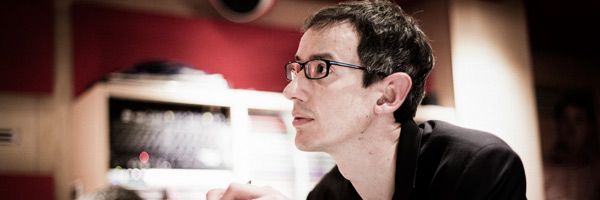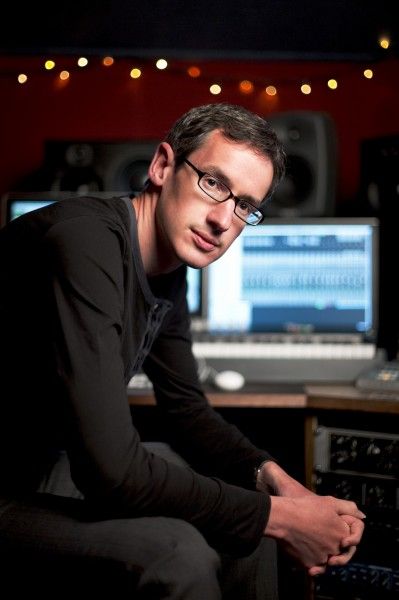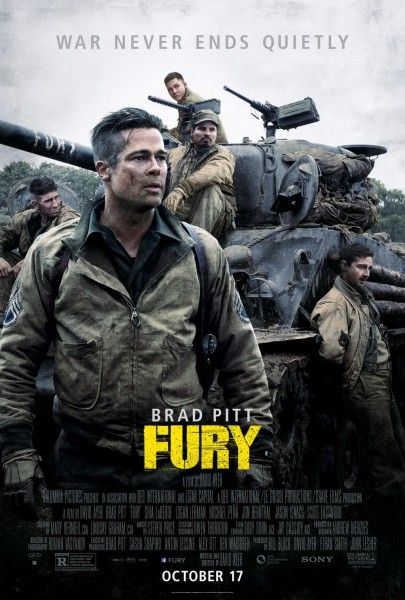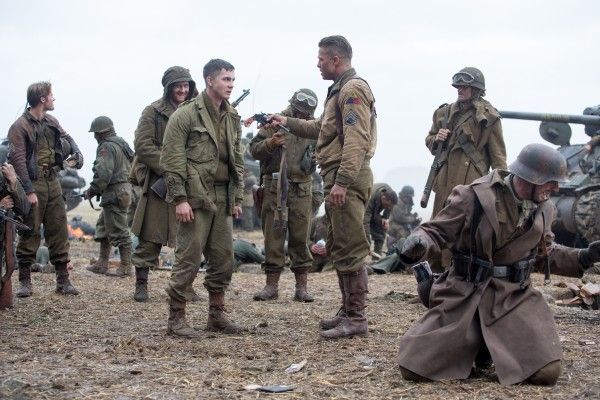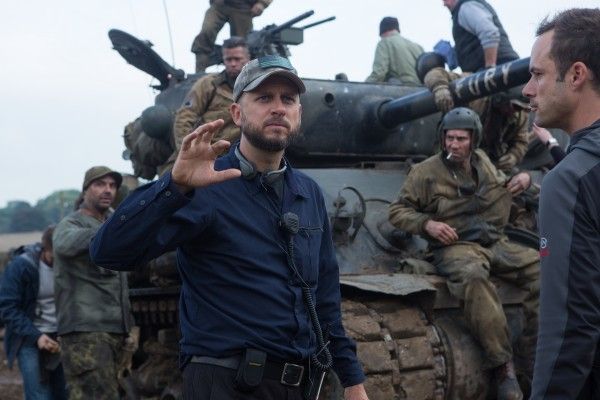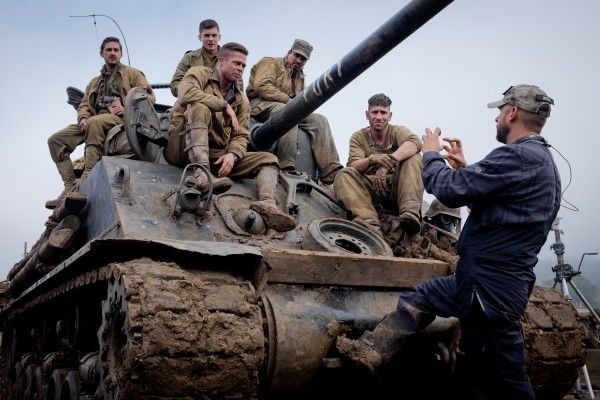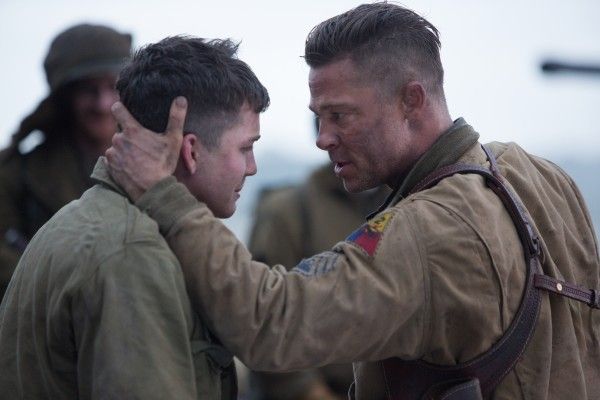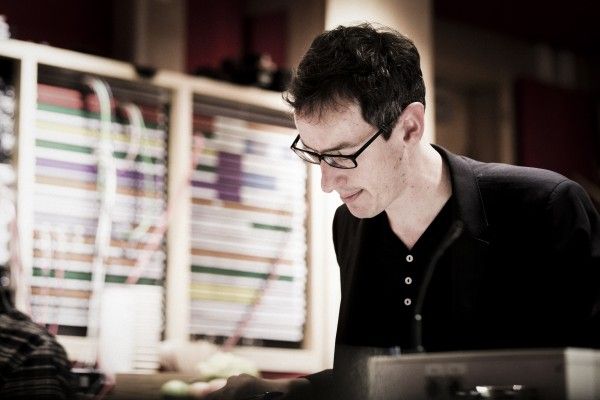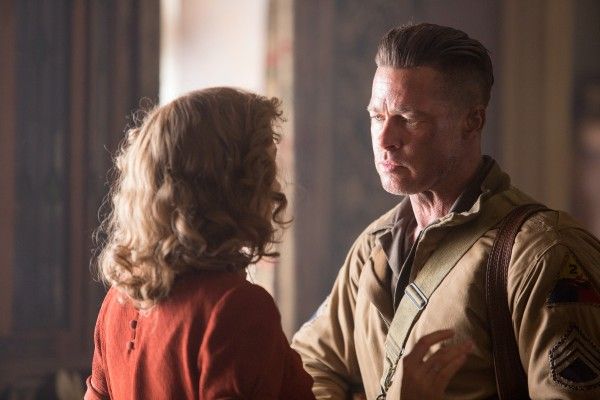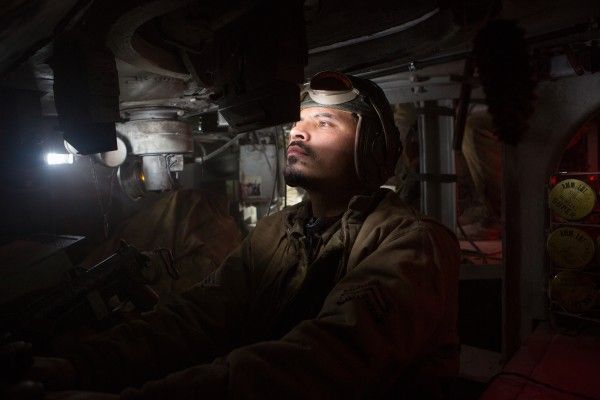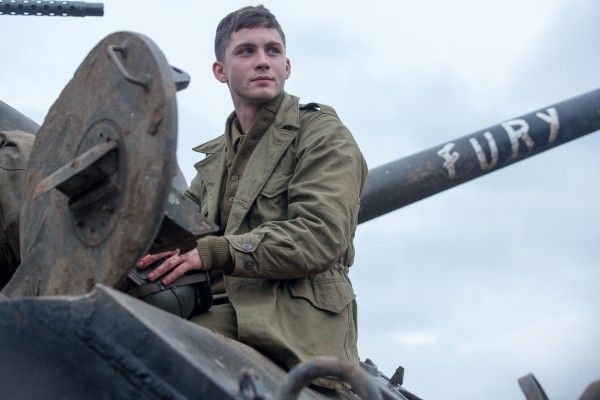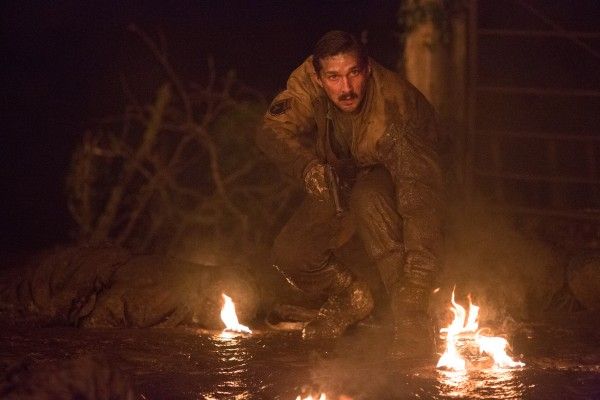Following his Oscar-winning score last year for Gravity, acclaimed British film and television composer Steven Price scores Fury, director David Ayer’s gritty WWII epic starring Brad Pitt as a battle-hardened sergeant who commands a Sherman tank and its five-man crew on a perilous mission behind enemy lines. Ayer’s dedication to the accuracy of the film’s portrayal of war as the Allies make their final push into the European Theater inspired Price to give the film’s score a raw, guttural feel using mechanized rhythms within emotional moments to convey the intense action and character themes.
In an exclusive interview, Price talked about his collaboration with Ayer, his used of cellos and choirs to portray the war-torn solders and actual WW II weaponry to create percussion sounds that echo the bombast of tank warfare, how he layered the sounds of a huge orchestra with those of intimate instrumental groups to convey the weight and exhaustion of the characters, his roots as an artist, his experience on The Lord of the Rings and Batman Begins, what he learned from composers Hans Zimmer, Howard Shore and James Newton Howard, and why he decided not to do Marvel’s Ant-Man once Edgar Wright left the project. Check out the interview after the jump.
Question: I really enjoyed your score for Fury. I thought it complimented the film so well. Can you talk a little about how this project first came together for you?
STEVEN PRICE: It was a script that I got sent and I’m pretty bad with scripts normally. It tends to take me a long time to read them. I prefer to see what they’ve shot and that kind of thing. But with this one, I felt like reading it and it was just really gripping. The way David (Ayer) describes the characters is the way the first scene is played out. I was absolutely gripped by it. And then, I made a couple of calls and it turned out they were actually shooting it about 40 minutes away from where I lived. I arranged to go and visit the set. I’d known about it for over a year really. I went to the set a couple of times and got to see a bit of them shooting a couple of scenes, but I also got to spend a bit of time with David. Once I did that, I realized that this was a huge passion project for him. I think he’s wanted to do this forever and I got a sense of that from him. I got a sense of just what he was trying to do. I was like, “Yes, please. I want to do that.”
How did you achieve the raw, guttural feel of the score that runs throughout the film? How did the choice of instruments vary depending on the context of a scene?
PRICE: The very first cue I wrote is actually the very first cue in the film, in the battlefield, when the horse comes across it. It was the weirdest one because usually I spend a long time trying to find the style for that, but with that one it just came together. The big thing that seemed to give me a way forward with the score was the choir. The first thing you hear really in that cue is this chanting choir that starts off like it’s very, very distant and then gradually gets closer to you as the General on horseback gets closer to you. That chanting idea gave me this key for the rest of the score. The whole score is built to feel quite heavy and quite exhausted in some ways, but constantly for the trudging forward as they were really. I used the voice a lot for that in the film. There’s an awful lot of choir recording. Sometimes they’re recorded as a group a long way away, but sometimes we got them whispering very close into the microphone – individual people – so I could make you feel like you were surrounded. It’s this idea that you’re in the middle of Nazi Germany. If you look at the timeline, we’re three weeks away from the victory. Actually, they were in the middle and they were surrounded. As the film shows, things were as intense and horrible as they ever could have been. The choir was a big thing at the start of the score, and then from there, it was just working with David over a long period of time and sending him ideas. For me, it was always this sense of weight and exhaustion and the fact that these people were actually in hell, so how that must feel to have been weighed down by that for so many years. That was the main thing.
How did you use cellos and a choir to portray the angst and the bond between the soldiers and then the World War II weaponry to create the percussion sounds that we feel during the tank warfare?
PRICE: There are a few different usages really. Because I was involved so early, I asked if they could just record some of the actual sounds of what they were doing for me. They had access to all these original tanks. They had been very, very accurate in what they used for weaponry. When I started out, they were good enough to give me access to a lot of recordings that they made, so I had anything from the sounds of the dog tags rattling on a man’s uniform to the sound of shells being dropped from the tank and the tank actually moving. The first sounds you hear in the film are made from [that]. They sound like ambient, strange, sort of hollow noises, but they’re actually played with slowed-down versions of dog tags and shells and that sort of stuff. So that was the first way that the visuals became the score. And then, when I had gone through and written the score proper, we were recording at Abbey Road in August this year and we got some of that weaponry brought into the studio where I had the action cues. Rather than using traditional film drums and that sort of thing, we had a percussionist play some of this weaponry. We had a couple armourers standing there to ensure that we didn’t do anything stupid. And then, we basically added a layer of the real grinding metal for the whole thing. I love all that. I like taking my leads from what I see rather than trying to impose. I like that way of looking at things and seeing what’s on screen and seeing how I can draw music out of it almost.
I tend to work in layers. There’s a huge orchestra in the film, but I also record a lot things with very intimate groups, and I like to be able to use the textures of those intimate groups. When I was recording this, a lot of what I was saying to the musicians was, “Sound more broken. Sound more delicate.” Whether you’ve got a lot of people playing or you’ve got a couple of people playing, they’re playing it so quietly that their fingers are slipping off the fingerboard and you get this feeling of exhaustion coming from your orchestra. That was kind of the thinking behind it, of using a lot of these intimates [sounds] – whether it be voices or small instrumental groups -- just to get this sense of human beings sort of trapped within the bigger machine. That’s really what the score is. It’s a lot of mechanized rhythms that are within these emotional moments.
When you’re scoring a large scale action movie like this, how do you balance the energy of the action we see up on the screen with the humanity of the characters and their story?
PRICE: A lot of it is the evolving process of the film really. We worked out as we went along where these moments were. The way that they shot the action sequences was this fantastic mix of moments of real violence and real visceral, guttural stuff, which obviously I was going to go with musically. But also, [in terms of] the reaction of the characters, David and I were very conscious when we were talking about music of always being with the characters. If you were seeing Norman, Logan Lerman’s character, and his reactions for the first time he’d really been in the war on the battleground, you went with it. That gave me these moments of emotion to draw on. So, we opened it up, and where there were those moments, he was very great at realizing there was something musically we could do there and letting me take that moment. It was a lot of give and take and a lot of experiment. It was all there for me really in the film.
How did you collaborate with director David Ayer to craft the sound and help him realize his vision for the film? What was that process like?
PRICE: A lot in the beginning was long conversations. When I first met him, we just sat in the middle of basically what was a battleground where they were readjusting cameras, and he had a half an hour break and he came over and sat with me for a while, and we just talked about it. It was freezing cold. My meetings are mostly in nice little studios or office buildings where executives are and that sort of thing. So, I’d gone wearing my jacket and shirt and all that sort of stuff. The first time I went, as soon as I arrived, I saw that everybody was wrapped up so warm and I realized I’d made a horrible mistake. Most of my first meeting, I was shivering through, which was a bit pathetic. David is a great kind of researcher and he knows so much about this stuff. He’s a fascinating man to sit with and talk about what he was trying to do character-wise and what we were trying to evoke. A lot of it came from that and that’s a year ago when I really started thinking about scenes.
I first started playing David’s stuff in around March or April of this year. And then we got into post-production. They were all based in L.A. and I was here in England doing the score. I would send him stuff most days and then sometimes we’d speak on the phone. But oftentimes, I would get a brilliant email which would be very concise. He has a military background and I think it’s given him this amazing communication ability where I’d get a two-line email which basically told me psychologically. It was never a musical note. It was always a psychological note about where the characters were and what the moment I was working on was going to link to later in the film or whatever it would be. And with these brilliantly concise notes, I’d go, “Oh, I get it. I know what he’s talking about.” And I could go onto the next stage.
It was a lot of constant communication really, but musically he was great at letting me explore and try things. I had said to him at the very beginning, “Please feel free to tell me you hate stuff.” I think he was thrilled about that. Once we got that out of the way, we could be honest with each other.
What character or situation in this film was the most fun or challenging for you to create some music for?
PRICE: Norman’s journey I think was really the challenging one. In fact, Norman and Wardaddy together, the way their journeys kind of interact, was the interesting thing for me. It was tricky, but it was also the most satisfying as well because they both have musical themes and I got to state them. Their themes entwine quite a lot in the film. Wardaddy was quite an abstract thing to start with without really knowing much about him. And it kind of takes shape as you find out more. With Norman, when we first meet him, we just see him in the distance. His theme is actually quite edgy. Every note has a different chord. It always moves around. He’s very unsettled. His eyes are flicking around and there’s this terror at being in a place he never expected to be. It was working out with him how his journey should be portrayed musically and where we were in his journey at various points. I watched the film and learned a lot to see where I was with that, and then just tried to make it feel that we were never jumping ahead of him and we were always in the experience with him. I think he’s the eye for us in the movie. That was the fun stuff.
It’s a very visceral experience watching this film. The enormous stress these characters undergo in war is palpable and we see how it transforms Norman.
PRICE: David and I talked about that so much. And then, what does he do after that? It’s something that David and I talked about often, about the pressure. What happens to these people afterwards? Actually, a lot of them didn’t get to afterwards. My granddads were both in World War II and they were in Africa and it was never discussed. They must have seen and done things. They’re gone now so I’ll never know. I’ve asked lots of family members while I’ve been working on this, “Did you ever ask them?” No one ever did. It’s a very different world now, of course. You can’t imagine what these people carried with them for the rest of their lives.
How much music did you compose and how much was used? Will the unused music end up somewhere else?
PRICE: There’s not much unused stuff. The music seemed to expand through the film as we went through it. There are a couple of things that I did along the way, and then I’d watch it through and think, “That was an early idea and now that the score has evolved perhaps I’ll put that to one side.” I recorded a couple of things that I wanted to have the option to use if we got to that stage. So, there were a couple of things and they’re sitting here. We mixed them and perhaps they’ll come out on some extended version of the CD if things go well at some point. I recorded a lot of music. It was probably the best part of a 100 minutes, I guess, that we recorded for this and there must be 90 something in it, so there wasn’t an awful lot that fell off the side.
Can you talk about your process of composing a score? What does it entail and what inspires you? How does your background within the industry come into play?
PRICE: It’s kind of there. With this one it was very much. I started before they put any of the film edits together, so it was very much my memories of the set and the script. I started just playing the piano really which isn’t my first instrument. I’m a guitarist by background. That’s what I used to do for sessions when I was younger and that sort of thing. We have several pianos in the house and I tend to just sit and fiddle around. The Norman theme was the one that sort of came out first. That was what I presented to David quite early on and we seemed to find something that had a style to it. But then, transferring that into the score and into the film itself was a matter of finding the colors for it really. And that’s where I needed to pitch it and to look at and to really draw on what they’d shot. It becomes this fusion really of the thematic writing and the melodic material which is found in the body and is the thing that gives the atmosphere to the film. It’s a lot of finding the instrumentation and experimenting with the acoustic sounds and the orchestral sounds, but also these more ambient things that I might be making from source recordings or whatever it may be. The writing side of it is the nice sort of melodic side and trying to get into the heart of the characters. But then that becomes entwined with the development of the actual score production and the way the overall thing will sound and how it feels to the picture.
What happens if the studio gives you notes? Does that help focus or hinder your creativity?
PRICE: Well I’ve been really, really lucky on the last couple of things in that I seem to have worked with directors who have such a strong vision that the studios have trusted them. I know that they must have been worried at various points that we were putting demos into the film very early on and needed things that I’ve done in my studio here. There are a few real instruments on it, but there are quite a lot of things played by keyboard and that sort of thing that will ultimately be orchestra. So, it must be really hard, but I’ve been really lucky. I know they’ve let a fair amount of experiments, and luckily on the last couple of things there’s been a moment halfway on in the process where they’ve really got what we’re trying to achieve and let me complete the experiment. So, yeah, I hear a lot of horror stories about getting notes from the studio, but I’ve been fortunate with that so far. I hope that continues.
Is part of the fun of being a film composer the fact that every director you work with has a different vision and a different way of working and some know more than others about music?
PRICE: Absolutely. And also, some have a totally different relationship with music. I’ve worked with some people, like Alfonso Cuaron, who’s incredibly great. He had a huge, broad knowledge of music, and we could talk about individual moments in individual symphonies and that sort of thing, and we could have a very musical conversation. Someone like Edgar Wright has this absolute catalog of songs and scores in his head that he can always refer to, whereas with David, we talked about emotion. We talked about the psychology of it. It’s all fascinating, and also what they want music to do for their film as well is very different each time. So yeah, I love that. I love the fact that we’re all in it together and we’re all trying to make the best possible thing we can. And part of that is getting to know each other’s likings and loathings, but also what makes you kick musically and what really gets to the nerve of what you’re trying to say with your film. That’s the bit of the job that I really find fascinating -- being with them in the trenches really and trying to tell their story.
What happens when the director edits to a temp score and then you come in to do the final score?
PRICE: It’s a funny one because my background in film is such that I did another thing called music editing where I used to put temp scores together. So I’ve kind of seen it from both sides. A lot of composers I know hate temp scores because people get attached to them. But I’ve seen how it can actually be really helpful in terms of pacing the score and getting the film into a shape that ultimately makes the composer’s job easier. So I have respect for them really. I think after everything in the whole process of filmmaking, temp scores are great if you use them for what they’re good for, if you use them for that early stage of support for things. On the last few things I’ve done, we’ve not really used a temp score. And on this one, I was pretty much scoring the film and putting cues in, previews, and all sorts of stuff from a very early stage. David was very specific. He wasn’t interested in listening to temp score really. He wanted the music to evolve as his film evolved and for the whole thing to develop together. With this one, there was a lot of work for me in terms of just the pitch change. Obviously, that’s my cue changing, too. And so, I was going to be revisiting things a lot. But it did mean that the voice kind of developed at the same time. The whole tone of the film and the music were at one quite early on, which I think was really useful.
How did scoring Fury compare to something like Gravity? Both were complex projects with very different directors. How did your approach differ?
PRICE: For me, with Gravity, when we started that, the first thought with Gravity was very much making it this immersive experience and this idea that there was no sound in space. The music was going to take you up there. The music was going to be next to you and carry you through the experience. Whereas with this one, the music was an element of a huge soundtrack and the actual sound effects on this one, and it was a war film. There was going to be an awful lot of dialogue, an awful lot of warlike noises, and that sort of thing. So, with this one, it was finding a place where music was going to be useful. It was a different usage of music in this one. It was me finding my way and working out what that collaboration would be with the sound department and how David wanted us to give and take through that process. They were both fascinating projects really in that sense. They both used music in a different sort of way. Both of them, what they did share and what I’m really grateful for is that both directors really appreciate what music can do emotionally and aren’t shy about it and don’t back away from letting music go for the stomach. The first thing David Ayer said to me was, “I want them to feel. I want the audience to feel.” And he punched his stomach as he said it. That’s what we were looking for. It was that really guttural feeling. We wanted you to feel just a glimpse of how this felt for them and music can help with that. So yeah, I’ve been lucky with those directors.
How was your experience working on epic films like The Lord of the Rings or Batman Begins?
PRICE: For me, personally, I was in a very different capacity for it. I was rather on the crew for the music so I was doing something differently. They all have their weird sort of issues. For me, I work very self-contained. It’s literally just me sitting here in a room doing it until the very end of the process when other musicians come in and instruments are recorded. But really 99 percent of the process, it’s me sitting here doing it all. Whereas, those bigger films, they’re huge operations. I was one of many working on Lord of the Rings and one of many working on Batman Begins. My experience with the big epic films like those was always a lot of people and a lot of communication. Whereas I try to keep things [self-contained], and luckily with the people I’ve worked with, they’ve been happy with keeping it very self-contained. That sort of suits me to let me make my mistakes in private and that sort of thing. It’s a bit different from the big scale Hollywood production thing. The music credits are usually at the end so traditionally the only people watching those credits are my mom. She feels it only fair to wait for the music people.
How do you decide what you want to do, what’s right for you, and why are these films something you chose to do?
PRICE: Some of it is literally gut instinct, I think. Even when I wasn’t composing and I was doing other jobs in film music where I’ve gone through the ranks really and done all sorts of orchestration and whatever, you kind of learn over years -- and I’ve been doing this for 16, 17 years now -- that if your first instinct isn’t quite there, then sometimes it’s not the right thing to do. There are moments in your life when you need to do things and you need the money or whatever, or you just want the work. I’ve said “yes” to things thinking it will be okay, and usually my instinct at the beginning was it wasn’t going to be okay, and that’s how it turned out. I’m kind of learning to try and trust my instincts a bit with it. And sometimes that doesn’t work out, but often if I’m excited by something, then I know I’m going to be able to give them my absolute all and stand by them every step of the way. Obviously, I think better things come out of that. But it’s just looking for projects all the time that you feel you can really give your all to.
How did growing up in the U.K. influence your music and inspire you? How do you feel your roots contributed to your development as an artist?
PRICE: It’s weird really in that in many ways I’ve not evolved at all. When I was about 5 years old, I used to have full reign of the record player. I would listen to all these albums that my parents had got, these 60’s and 70’s things. And now, I’m lucky enough to go into Abbey Road and record there. It’s been this amazing sort of through-line really from what I used to listen to and obsess with when I was a kid. And now I get to play in the same room with the same bits of equipment and that sort of thing. A lot of my musical experiences have been through film. I studied music all the way through college, but as soon as I graduated from university, I got straight into London and got straight into film music. So really my experiences have been being around the orchestras in London and being around the people who work in film music. A lot of great composers are based here and a lot a great skilled orchestrators, and I’ve been able to learn from all of them along the way. And then, you have these amazing projects which come over from America, and I was lucky enough to work on things like Lord of the Rings or Batman Begins back in the day with these incredible filmmakers. Being based over here, I’ve been able to have this broad kind of education and all sorts of different music and a lot of kind of films and also different styles and genres. And so, all of these things have influenced me along the way and I take a little bit from everything I do. I’ve been lucky to work with a lot of great people and learn from them.
At any point in your artistic career, was there music that really impressed you and made you say that’s what I’m aspiring to? Who or what were your inspirations?
PRICE: It’s a funny thing with the inspiration thing. There’s always loads of music around that I absolutely love and films going back to when I started making film music in the mid-80’s like E.T. or Back to the Future and these things that I went, “God, what a job! What a fantastic thing to do with my life, tell stories with music and that sort of stuff.” But really for me, at the moment, the thing that’s coming together in my mind is the realization that I can love this music and really, really admire it, but the moment I try and do anything like it, I’m doomed. I’m not very good at sounding like other people. When you’re going through your 20’s and trying to get a break and that kind of thing, and you’re trying to do something that sounds like film music, your idea of what it would be, it never really worked out for me and it’s only really when I learned to trust the fact that I could only really sound like me. And hopefully, if I keep working at that, then it might come out with something other people like and it’s starting to come together. I find that I love so much stuff and respect so many people who work in this industry and music in general. I’ve kind of learned that I’ve got to just stick to what I can do and try and do that really.
You’ve collaborated with Howard Shore as music editor on The Lord of the Rings trilogy and with Hans Zimmer, James Newton Howard, and others. What did you learn from those experiences?
PRICE: Obviously, musically they’re all very different and they all have their geniuses really. For all of them, I think it was this attitude of being a filmmaker, because I think it’s a given at that level that they’re brilliant musicians and they’re brilliant composers. But when you see them in a room with directors, they’re not necessarily talking about music. No one’s being precious about their music. They want the film to be great. And that was the huge lesson for me along the way to be a filmmaker. And yes, I’m leading the music department kind of thing and that responsibility with the music is with me, but really that job is one of many. The sound department is also doing their thing. The CGI lot are doing theirs. Everyone is working together to do it. So, it’s that collaborative nature that I learned from them. And also, with the great people that you work with, it’s that they’re never giving up and they’re never thinking something’s finished until they’ve really, really run out of time. They keep pushing in case there’s a better idea around the corner.
What are your thoughts on the early Oscar buzz this film is generating and your score in particular?
PRICE: Oh, I have no idea. The whole Oscar thing last year took me so much by surprise. I realized at that point that I know nothing. I mean, I sat in the mix room mixing the Gravity score utterly convinced that most people would hate it, and then all of that happened. So I kind of feel that I wouldn’t dare ever comment on anything like that too soon. It’s all about what people make of it when it gets out into the open really. I just hope people connect with it and feel some of the experiences that we were wanting to give. It’s really encouraging because again I sit here in England and I actually feel very disconnected from it sometimes, so it’s nice to hear that people actually see it over there.
What are you working on next?
PRICE: Well, because I only finished Fury very recently, I’m not [working on anything] at the moment. I just finished a very small animation thing for the BBC over here in England. I was supposed to be doing a film called Ant-Man right now for Marvel. Edgar Wright is a friend of mine and we worked together on a few projects before and that was all very exciting. I was looking forward to that, but then when he left the project, it didn’t feel right to take the vision that we’d spoken about musically onto it so I left as well. We’d talked about it lots and I’d started doing bits and it was ever so exciting, but then when he left, I thought, “I can’t really do this now.” It would have felt very wrong. I’m having a bit of a vacation at the moment. There will be hopefully something fun around the corner.
Fury is now in theaters nationwide. The Fury original motion picture soundtrack is now available on Varese Sarabande Records.

